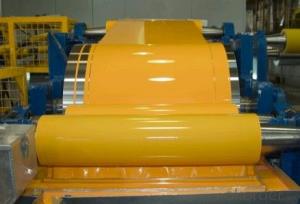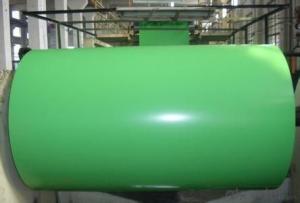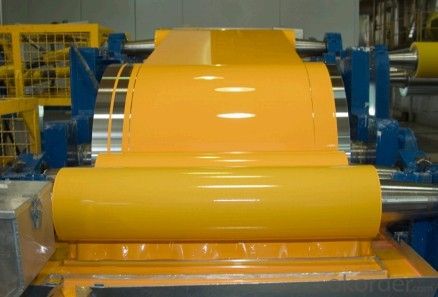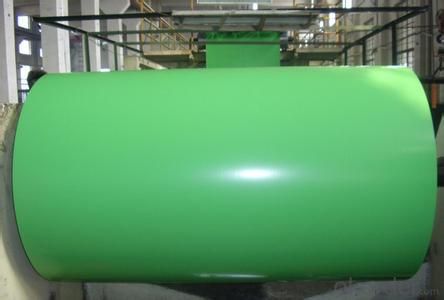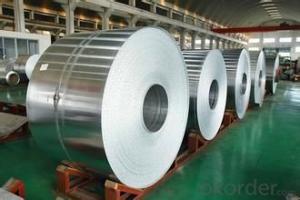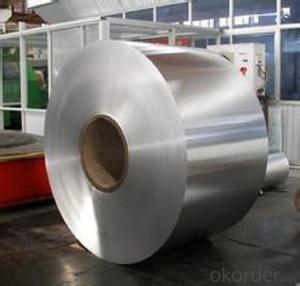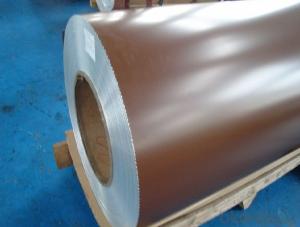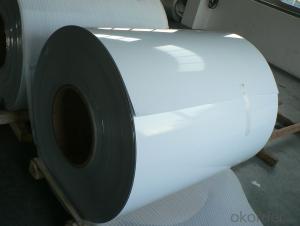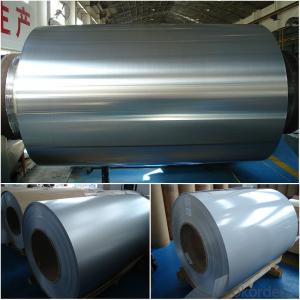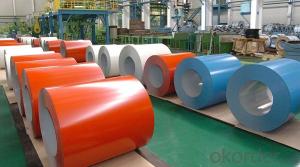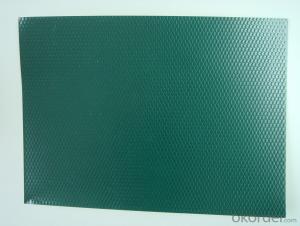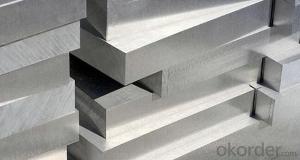China 3003 Coated Aluminum Coil - Yellow Coil Coating Aluminium Coils for ACP
- Loading Port:
- Shanghai
- Payment Terms:
- TT OR LC
- Min Order Qty:
- 5 m.t.
- Supply Capability:
- 10000 m.t./month
OKorder Service Pledge
OKorder Financial Service
You Might Also Like
Specification
1. Structure of Yellow Coil Coating Aluminium Coils for ACP Description
• Product: Aluminim coils
• Application:
corrugated roofs, outer walls, ovens, electrically controlled cabinets.
household appliances, transportation, base plate, color coating.
industrial freezers in the residential and industrial buildings.
refrigerator backplane, gas stove, air conditioner, microwave, LCD border.
• Advantage: Full production line with all kinds of coils supply
2. Main Features of the Yellow Coil Coating Aluminium Coils for ACP
• Our goods quality is top, the surface is smooth, and every steel coil
• No Joint, No Bends, no spots, no roller marks.
• MTC will be provided with goods, third part inspection is acceptable, for example, SGS, BV. Etc
3. Yellow Coil Coating Aluminium Coils for ACP Images
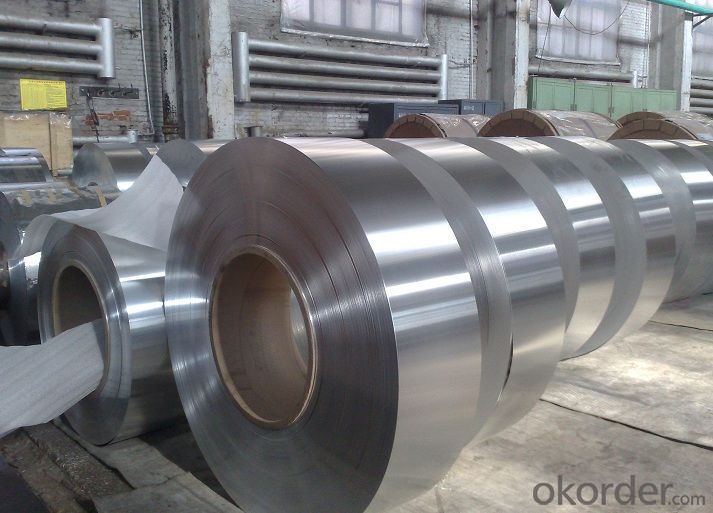
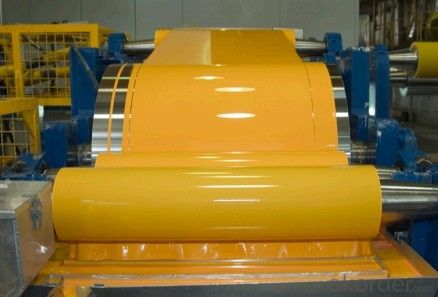
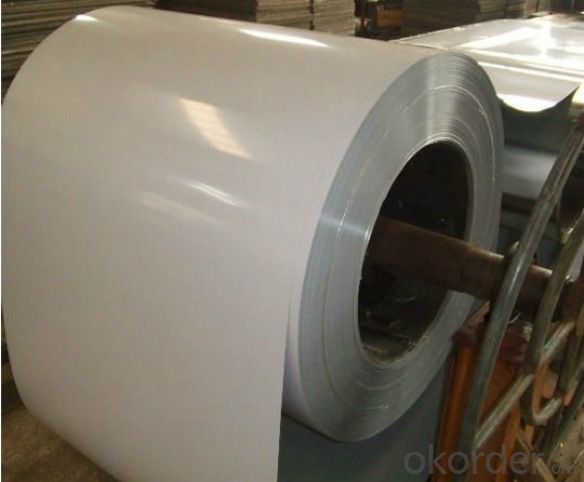
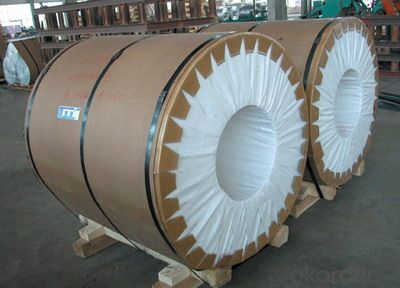
4. Yellow Coil Coating Aluminium Coils for ACP Specification
Alloy | AA1050/1100/3003/3005/3105/5005/5052 etc |
Thickness | 0.03mm—4.0mm |
Width | 10mm—1600mm |
Coating | PVDF, PE |
Coatingthickness | Usually16-25 micron, could be 33-40 micron |
Color | According to Ral |
Standard | ASTM-B 209 GB/3008-2006 |
Usage/ApplicationsCoated Aluminum Coil/Sheet | Constructionand decoration, electronic appliances, lighting decoration, air-condition airpipe, sandwich panels and drainage, etc |
5.FAQ of Yellow Coil Coating Aluminium Coils for ACP
We have organized several common questions for our clients,may help you sincerely:
① How about your company?
A world class manufacturer & supplier of aluminum coil and alloy blanks. Aluminum production base is comprised of 18 aluminum annealers, 10 coil and foil mills, 4 continuous production lines, 2 hot rolling production line and 3 prepainted lines.
Export 5000 tons per month to Asia, America and Middle East. Always do the best for our clients.
②Can you guarantee the quality of the products?
We are responsible for the quality of materials to get a long-term cooperation with clients in a reasonable period of time and we are glad to arrange and coordinate any third party inspection for you.
③What is the delivery time after purchase?
35 day after receiving client’s deposit or correct LC
- Q: Can aluminum coils be used in the production of aluminum foam panels?
- Yes, aluminum coils can be used in the production of aluminum foam panels. The coils are typically processed through a foaming method, such as powder metallurgy or melt route, to create a foam structure. This allows for the production of lightweight and strong aluminum foam panels suitable for various applications, including in the automotive, aerospace, and construction industries.
- Q: This question asks if aluminum coils are susceptible to rusting.
- <p>Aluminum coils do not rust in the traditional sense. Aluminum reacts with oxygen in the air to form a thin, protective layer of aluminum oxide on its surface, which prevents further corrosion. This oxide layer is different from rust, which is iron oxide. While aluminum can tarnish or corrode under certain conditions, such as exposure to certain chemicals or harsh environments, it does not rust like iron or steel. Proper storage and handling can help maintain the integrity of aluminum coils and prevent any form of corrosion.</p>
- Q: Is it possible to recycle aluminum coils without any loss in their quality?
- <p>Yes, aluminum coils can be recycled without damaging their quality. Aluminum is one of the most recycled materials due to its ability to be recycled indefinitely without any loss in quality. The recycling process involves melting the aluminum, which can then be reshaped into new coils or other products. This process is energy-efficient and environmentally friendly, as it requires significantly less energy than producing aluminum from raw materials. Recycled aluminum maintains the same strength, durability, and appearance as new aluminum, making it a sustainable choice for various applications.</p>
- Q: I have a muffin pan made of aluminum foil and I do not know if i can put it in the oven to cook some muffins. Many sights say it will melt but they say that about putting a sheet of foil at the bottom of the oven for a long time. I just want it to be in their for half an hour to make muffins.
- This Site Might Help You. RE: Can you put aluminum foil in the oven? I have a muffin pan made of aluminum foil and I do not know if i can put it in the oven to cook some muffins. Many sights say it will melt but they say that about putting a sheet of foil at the bottom of the oven for a long time. I just want it to be in their for half an hour to make muffins.
- Q: What are the advantages of using aluminum coils in HVAC systems?
- There are several advantages of using aluminum coils in HVAC systems. Firstly, aluminum coils are significantly lighter compared to traditional copper coils. This makes them easier to handle and install, reducing the overall labor and transportation costs. Additionally, the lighter weight of aluminum coils puts less stress on the HVAC system, resulting in less wear and tear over time. Another advantage of aluminum coils is their superior resistance to corrosion. Aluminum is naturally resistant to rust and oxidation, which can prolong the lifespan of the coils and enhance the overall durability of the HVAC system. This resistance to corrosion also helps maintain the efficiency of the system, as the coils remain clean and free from clogs caused by debris buildup. Moreover, aluminum coils have excellent heat transfer properties. They can efficiently absorb and release heat, allowing the HVAC system to cool or heat the air more effectively. This improved heat transfer efficiency can result in energy savings and reduced operating costs, as the system requires less energy to achieve the desired temperature. Furthermore, aluminum coils are more environmentally friendly compared to copper coils. Aluminum is a highly recyclable material, and using aluminum coils can contribute to reducing waste and conserving resources. Additionally, the process of manufacturing aluminum coils requires less energy and produces fewer greenhouse gas emissions, making it a more sustainable choice for HVAC systems. In summary, the advantages of using aluminum coils in HVAC systems include lighter weight, corrosion resistance, superior heat transfer properties, energy efficiency, and environmental sustainability. These benefits make aluminum coils a preferred choice for many HVAC professionals and homeowners alike.
- Q: Are aluminum coils compatible with different joining methods?
- Yes, aluminum coils are compatible with different joining methods. Some common joining methods for aluminum coils include welding, soldering, brazing, and mechanical fastening. The choice of joining method depends on the specific application and requirements.
- Q: What are the common surface finishes for aluminum coils in the electrical industry?
- The common surface finishes for aluminum coils in the electrical industry include mill finish, anodized finish, and painted finish.
- Q: How are aluminum coils used in insulation applications?
- Aluminum coils are commonly used in insulation applications as they are lightweight, durable, and have excellent thermal conductivity properties. They are typically used to create a radiant barrier or reflective insulation, where they are installed between the outer walls or roofs of a building and the insulation material. The reflective surface of the aluminum coil helps to reflect radiant heat away from the building, reducing heat transfer and improving energy efficiency. Additionally, aluminum coils are also used in HVAC systems to create air ducts that ensure proper insulation and prevent heat loss or gain.
- Q: Can aluminum coils be coated with protective films?
- Yes, aluminum coils can be coated with protective films. These films provide a layer of protection against scratches, corrosion, and other damage, helping to prolong the lifespan and enhance the appearance of the aluminum coils.
- Q: What are the methods to prevent rust formation on aluminum coils during storage and transportation?
- <p>To prevent rust on aluminum coils during storage and transportation, ensure that the coils are clean and dry before storage. Store them in a cool, dry place away from moisture and corrosive substances. Use protective wrappings or coatings to shield the coils from the environment. Maintain proper ventilation to reduce humidity. Avoid stacking the coils directly on the ground; use pallets or racks to keep them off damp surfaces. Regularly inspect the coils for signs of moisture or damage and address any issues promptly.</p>
Send your message to us
China 3003 Coated Aluminum Coil - Yellow Coil Coating Aluminium Coils for ACP
- Loading Port:
- Shanghai
- Payment Terms:
- TT OR LC
- Min Order Qty:
- 5 m.t.
- Supply Capability:
- 10000 m.t./month
OKorder Service Pledge
OKorder Financial Service
Similar products
Hot products
Hot Searches
Related keywords
